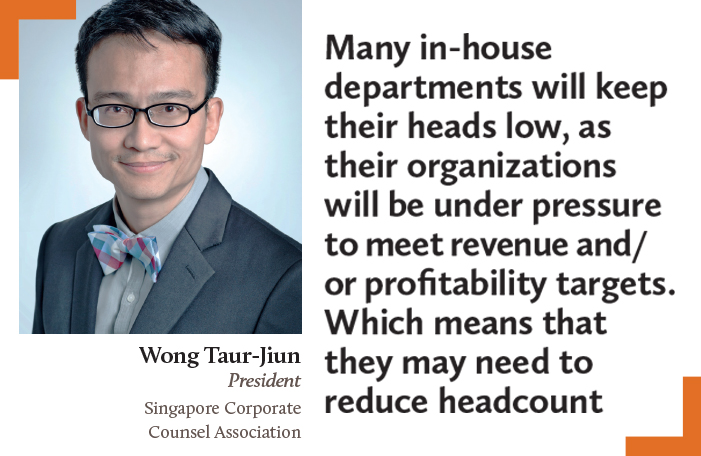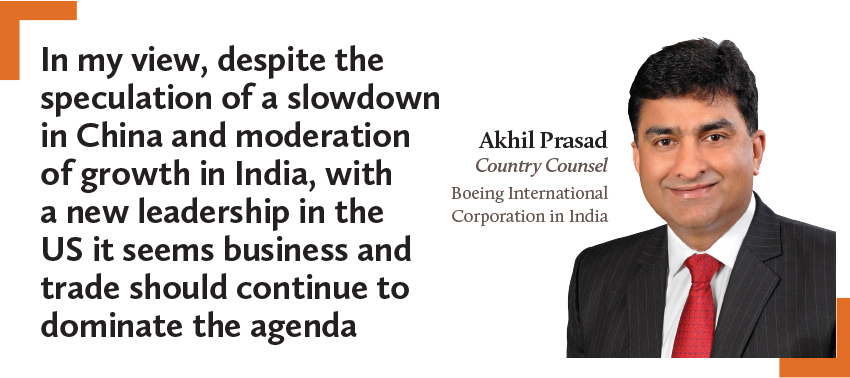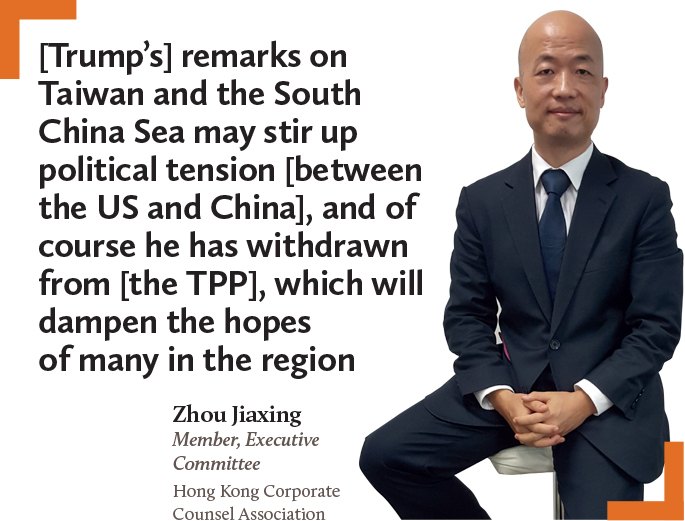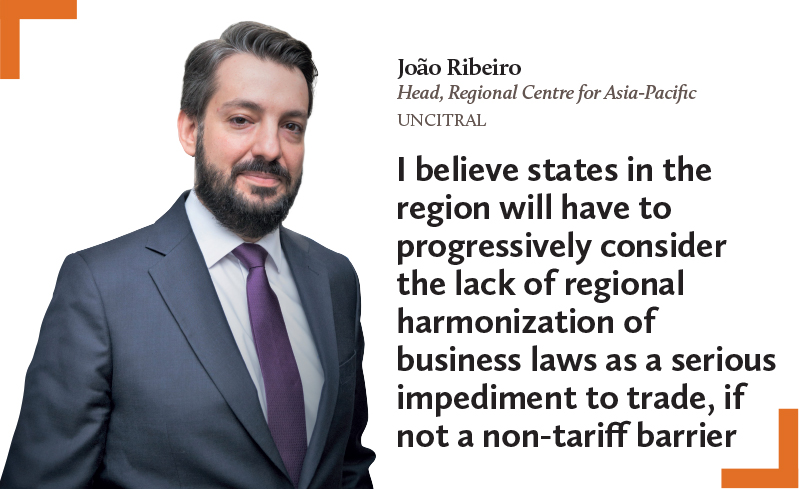What does the Year of the Rooster have in store for Asia’s law firms and in-house community? John Church asks some cool heads for their take on things
The cock has crowed to herald the Year of the Rooster, and 2017 looms large as much for the air of uncertainty it brings as anything else.
A quick scan of Steve Vickers & Associates’ latest annual risk analysis, the 2017 Asia Risk Assessment, shows the rooster may not be a favourite year for many in the region. As the West rebels against a globalization agenda that many see as eroding fundamental benefits they have enjoyed for decades, politics has taken a swerve to the far right. But increasing
nationalism and protectionism are not just the bastion of the West, as recent elections and political crises in Asia have shown.
The shock election of Donald Trump as US president, like it or not, followed Britain’s shock decision to bow out of the EU, which followed a mass exodus of humanity from war-torn Syria and an endless news reel of terrorist incidents across the globe. Protectionism and nationalism are on the increase, while liberalization and globalization take a turn for the worse. Or do they? And what does all this mean for in-house counsel, law firms and their business in our Asian region? What issues concern them, or please them, most?
We canvassed a cross-section of corporate counsel, academics and other experts about what they see in the cards for 2017, how events will shape the region, and the implications for in-house counsel, lawyers and the wider legal community.
“As I write this I have read that a major law firm [King & Wood Mallesons] has gone under in Europe, and another well regarded firm [Olswang] had to merge with two others in order to survive the deadly competitive environment that was in 2016,” says Wong Taur-Jiun, president of the Singapore Corporate Counsel Association (SCCA). “However, I am not sure if the business of law is being disrupted, or is merely a victim of the overall economic environment, or both.
“Some have predicted that 2017 will be the last legs of a winter of discontent, but if we believe in 10-year cycles, then we haven’t seen a major correction since 2008. If that happens, we should expect a bigger fallout, and more firms to fall by the wayside. Many in-house departments will keep their heads low, as their organizations will be under pressure to meet revenue and/or profitability targets. Which means that they may need to reduce headcount, or cut external counsel spend.”
Akhil Prasad, country counsel for Boeing International Corporation in India, says despite the doom and gloom, trade will lead the way in the region. “In my view, despite the speculation of a slowdown in China and moderation of growth in India, with a new leadership in the US it seems business and trade should continue to dominate the agenda,” he says.
“Trump, being a very successful businessperson himself, and his vision to look at global trade in the same fashion, should be good news for international trade. Globalization is an irreversible process and will continue to grow and expand. With China and India being huge markets and also being efficient manufacturing and services destinations, respectively, it seems to me that trade facilitation and collaboration should continue to receive huge focus and attention.”
Prasad adds that the impact of Trump at the US helm and the impact of Brexit, and whether or not there are more EU exits, will be the biggest economic moments in 2017. He says the legal community will have a great opportunity to assist governments, corporations, politicians and leaders so that development and business prosperity remains a focus. “For any economic activity to be successful, it requires strong and positive socio-economic-political stability, and an environment free from corruption and terrorism.”
Author Andrew Godwin, associate director of the Asian law Centre, Melbourne Law School, says that major events of 2016, including Brexit and the election of the new US president, are highly likely to have an impact on the cross-border M&A market, and some of these impacts are likely to be positive. “For example, the drop in the value of sterling may continue to drive acquisitions of UK companies and UK assets this year,” he says. “In addition, the proposed spending on infrastructure in the US is likely to have a positive impact on M&A activity in that market, and in other key supplier markets.”
On the downside, the increasing uncertainty is likely to result in the deferral of business and investment decisions. “In addition, there will be legal uncertainty as a result of the proposed reforms in the US [which include Trump’s withdrawal from the Trans-Pacific Partnership and his ‘America first’ sentiment, among others], and also the Brexit process,” says Godwin. “In China, concerns about capital outflows and corporate indebtedness are likely to lead to greater restrictions on capital transfer and lending activities.
“An interesting question is what challenges all of this might throw up for law firms, particularly international firms. More than ever before, it will be important for global law firms to respond to opportunities and threats in an agile manner, utilizing their global network to channel work and resources to productive sectors and geographies.”
Wong says the impact of Brexit might be delayed, given the two-year window that is expected for article 50 to enable the UK’s withdrawal. “So more direct, and more uncertain, is the Trump presidency,” he says. “The immediate concern is where world trade [with the US] will go, and whether there will be pull-back of US FDI in an effort to ‘Make America Great Again’. All these developments could affect the size and growth of the businesses that employ in-house counsel.
Wong says the Trump presidency’s impact could be largely economic, but Brexit will have legal ramifications that will no doubt lead to a proliferation of seminars given by law firms on the subject.
Closer to Asia, the assertion of China will change the way games are played. “It’s not just the sheer political power that China now wields – the world will have to contend with the likes of Alibaba and Alipay [ANT Financial], and how that shapes the way business is done and moneys are paid,” he says. “China has one of the most vibrant fintech markets – we should not be surprised that the next game changer will come from the Middle Kingdom. Gone will be the days when in-house counsel shake their heads over the FCPA [Foreign Corrupt Practices Act] or rule of law concerns with their trading partners in China; now many of these Chinese overlords write their pay cheques. A culture shift is inevitable.”
Zhou Jiaxing, a member of the Hong Kong Corporate Counsel Association’s executive committee, says the Year of the Rooster will be one of great uncertainty in many aspects. “Politically, there is the Trump presidency, and according to his remarks he proposes to change fundamentally many policies that have been consistent with the US government, for example his position on international trade will have an impact on Asia,” says Zhou.
“His remarks on Taiwan and the South China Sea may also stir up political tension between the two countries, and of course he has withdrawn from the Trans-Pacific Partnership [TPP], which will dampen the hopes of many people for the region. The US will be a great source of uncertainty.”
Zhou sees little to smile about with global economics. “The global economy is in a very uncertain period; the EU economy is not doing very well and is under strain, especially the financial situation in southern Europe. If other economies go bust, triggering the need for [European] central bank aid, that may have a domino effect in other parts of the world.
“Back to Asia, the Chinese economy has been doing well so far, but some people are worried about bubbles in the economy. A lot of growth of GDP has been propped up by investment in real estate. The central government is aware, and said at the beginning of the year that their target for 2017 is not growth of GDP, but rather the beginning of reforms to the economy, especially on the supply side, to cut away overcapacity in many industry sectors.
“Generally, 2017 is a year of uncertainty, but in Asia I think we should look to the three largest economies – Japan, China and India. Japan is mostly stagnant, but India is doing quite well, and China I think will do well, although there are many challenges. As the TPP won’t go ahead, a China-led treaty may promote more trade within Asia.”
João Ribeiro, head of the United Nations Commission on International Trade Law’s (UNCITRAL) regional centre for Asia-Pacific, says 2017 will be a decisive year for mega-trade agreements in the region. “This will require a considerable level of harmonization of contract law, of standards for electronic communications in international contracts for implementing the trade facilitation agreement and sound regimes of commercial and investment dispute settlement,” he says.
“Only 21 out of 56 states in the Asia-Pacific region have laws based on the UNCITRAL Model Law on International Commercial Arbitration; only two out of 56 states have legislation based on the UNCITRAL Model Law on International Commercial Conciliation; only 14 out of 56 states are parties to the UN Convention on Contracts for the International Sale of Goods (CISG); and only two states have ratified the UN Convention on the Use of Electronic Communications in International Contracts.
“So, I believe states in the region will have to progressively consider the lack of regional harmonization of business laws as a serious impediment to trade, if not a non-tariff barrier to trade.”
As in-house lawyers and others look to what changes may affect them in 2017, the bottom line will unsurprisingly figure highly on their agendas. Prasad says that as businesses become fiercely competitive, an aspect that will continue to be under greater scrutiny will be control of costs.
“It’s therefore to be expected that the propensity for an in-house counsel to do more work internally, and outsource less, will be the norm in 2017,” he says. “Further, clients will reach out to their external counsel for assistance to help for navigation in complex issues, which may not always be legal. Thus an in-house counsel will enjoy a lot of trust and patronage from business colleagues, if they are able to receive business and strategic counsel and key insights on risk management in a transaction. The external counsel, on the other hand, will continue to build strong partnerships with in-house counsel so that they as a team exceed business expectations.”
Tanya Khan, vice president and managing director, Australia and Asia-Pacific, for the Association of Corporate Counsel, says an evolution in the role of in-house counsel in past years may this year have an impact on spending. “Looking back, we’ve seen the relationship between in-house and outside counsel evolve, from that of a client-provider relationship to a partnership, with both parties working towards achieving mutually beneficial results,” she says.
You must be a
subscribersubscribersubscribersubscriber
to read this content, please
subscribesubscribesubscribesubscribe
today.
For group subscribers, please click here to access.
Interested in group subscription? Please contact us.































